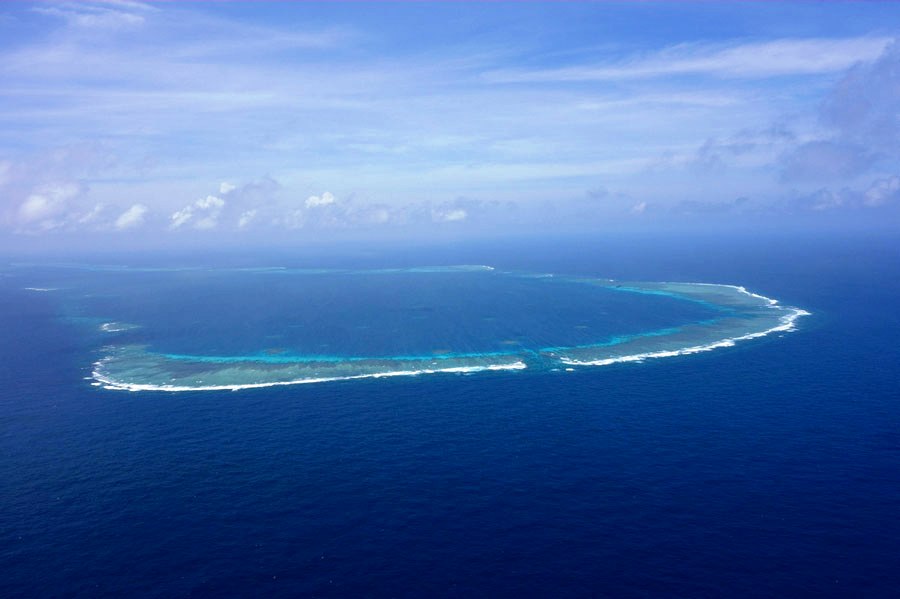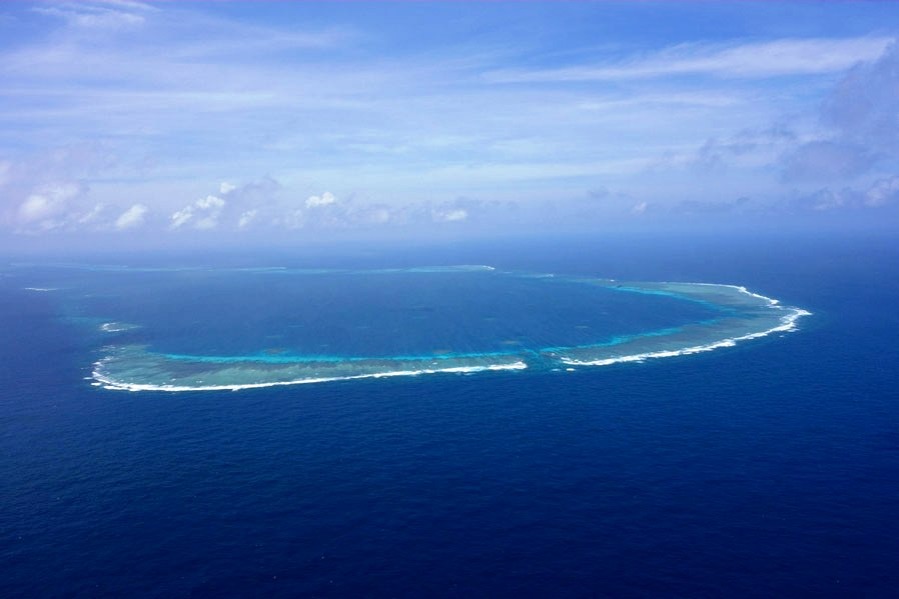The invalid ruling on the South China Sea and its lasting damage


Every July 12, like a ghost that refuses to be exorcised, the so-called South China Sea arbitration ruling is dragged back into the spotlight.
The Philippines, backed by the United States and its allies, hypes this 2016 decision, dressing it up as a triumph of international law. But let's call it what it is: a politically charged farce that twists facts, tramples legal principles, and dismisses China's indisputable sovereignty and maritime rights. Far from a beacon of justice, it stands as a grotesque abuse of the United Nations Convention on the Law of the Sea (UNCLOS) dispute settlement mechanism. This commentary rips apart the arbitration's fa?ade, exposing its violation of state consent, its mockery of fairness, and its utter failure to resolve anything meaningful. It also probes the broader implications for a system meant to uphold peace and order on the world's oceans, revealing a dangerous precedent that threatens the integrity of international law.
The UNCLOS mechanism: A fragile promise born of compromise
The UNCLOS dispute settlement mechanism is no mere legal footnote — it's a bold attempt to tame the chaos of maritime disputes with structure and reason. Forged through a decade of grueling global negotiations in the 1970s, it balances diverse legal traditions, political realities, and historical practices to offer a lifeline for peaceful resolution in a world where oceans can spark conflict. Its genius lies in its flexibility: states can choose their poison — be it the International Tribunal for the Law of the Sea (ITLOS), the International Court of Justice (ICJ), or arbitration under Annex VII or VIII. This isn't a rigid cage; it's a menu tailored to sovereignty, allowing nations to select a path that aligns with their legal culture and trust.
The mechanism doesn't rush to force. It prioritizes negotiation and consultation, only flexing its compulsory muscle when talks collapse. This design acknowledges the raw sensitivity of maritime disputes — issues like sovereignty or boundary delimitation can ignite national pride and geopolitical tensions. It's a bridge between law and politics, a tool to soothe conflicts with legal clarity. When it works, as seen in the Bay of Bengal Case, where ITLOS applied a three-stage methodology to delimit maritime zones, it delivers enforceable outcomes that states respect, proving its worth. Similarly, in the Saiga Case, ITLOS ruled that coastal states must exercise enforcement powers reasonably, safeguarding navigation freedoms. These successes show the mechanism's potential to adapt to modern challenges while staying rooted in its legal foundations.
But its strength is also its Achilles' heel: state consent. Without a nation's willing agreement, the system wobbles. The mechanism's legitimacy hinges on voluntary participation, expressed through ratification of UNCLOS or specific declarations under Article 287. When consent is clear, the process shines. But when it's disputed or ignored, as in the South China Sea arbitration, the entire edifice risks collapse. This case didn't just test the mechanism's limits — it nearly broke them.
State consent: The Heart ripped out
State consent isn't some abstract legal nicety — it's the beating heart of international law. Under UNCLOS, it's the cornerstone that keeps the dispute settlement mechanism credible. States signal their agreement by ratifying the Convention, sometimes adding declarations to choose their preferred dispute resolution forum. This principle, enshrined in the Vienna Convention on the Law of Treaties, ensures that no state can be bound by a treaty — or its mechanisms — without its consent. When consent is genuine, the system produces binding decisions that stick, as seen in cases where states willingly submit to ITLOS or arbitration.
The South China Sea arbitration, however, is a textbook case of consent being trampled. In 2013, the Philippines hauled China before an Annex VII tribunal, framing the dispute as a matter of maritime rights under UNCLOS. China rejected this outright, arguing that the real issues were sovereignty and maritime delimitation — matters it had explicitly excluded from compulsory settlement under Article 298. Beijing didn't just sit this out, it loudly and repeatedly denied the tribunal's jurisdiction through public statements and diplomatic channels. Yet the tribunal barreled forward, issuing a 2016 ruling that favored the Philippines, declaring China's "nine-dash line" baseless and certain features as mere rocks rather than islands.
China's response was unequivocal: it refused to recognize the ruling. And why should it? Without consent, the decision is a legal nullity — a hollow echo with no binding force. The tribunal's insistence on ruling over matters China had excluded wasn't just overreach, it was a direct assault on the principle of state consent. By ignoring China's reservations, the tribunal turned a system built on voluntary agreement into a tool of coercion. This move didn't just undermine UNCLOS — it set a dangerous precedent that could erode trust in international law itself. If tribunals can steamroll a state's explicit opt-outs, what's left of sovereignty? The arbitration didn't just fumble a case, it risked unraveling the delicate balance that makes UNCLOS work.
The Arbitration: A political circus, not justice
The South China Sea arbitration wasn't a quest for truth — it was a geopolitical hit job. The Philippines cloaked its case as a legal dispute, but the stench of politics was unmistakable. The tribunal's ruling — that China's historical claims had no basis and certain features deserved no maritime zones — was less about interpreting UNCLOS and more about serving powerful interests. External puppet masters were pulling the strings, and the tribunal was their stage.
Consider the players. The United States, though not a party to UNCLOS, played a starring role behind the scenes. In December 2015, just months before the ruling, the US State Department released a report on China's maritime claims, conveniently providing a "guide" for the tribunal on handling the "nine-dash line" and historical rights. This wasn't a neutral analysis — it was a blatant attempt to shape the outcome. Then there's Judge Shunji Yanai, the Japanese ITLOS president who oversaw the tribunal's formation. Yanai wasn't just a judge, he doubled as an advisor to Japan's government, working to strengthen the US-Japan alliance and coordinate policies on disputed territories. His dual role cast a long shadow over the tribunal's impartiality.
The tribunal's conduct was a masterclass in bias. It bent over backwards for the Philippines, allowing late submissions of additional evidence well beyond reasonable deadlines. It accepted shaky expert testimony — such as claims about environmental damage — without scrutiny, while dismissing China's historical records as irrelevant. Standard evidence rules, like those requiring rigorous cross-examination, were tossed aside. The tribunal even went so far as to hunt for evidence on the Philippines' behalf, effectively acting as its advocate. This wasn't a courtroom — it was a kangaroo court, rigged to deliver a predetermined outcome.
Legal scholars have torn into the tribunal's approach. Professor Stefan Talmon, an international law expert, argued that the tribunal "rewrote the Convention", creating new rules on historical rights and island status that lack support in state practice. The tribunal's interpretation of Article 121, which defines islands, was called "unprecedented" and "divorced from reality". By declaring features like Itu Aba (Taiping Island) — which has fresh water and human habitation — a mere rock, the tribunal defied logic and the Convention's text. This wasn't interpretation, it was judicial lawmaking, a dangerous overstep that threatens the predictability of international law.
A triple failure: Law, fairness and peace
The arbitration fails on every count that matters. Legally, it's a travesty. By wading into sovereignty and delimitation — areas UNCLOS doesn't cover and China had excluded — the tribunal didn't just stretch its mandate, it obliterated it. It conjured rules on "historical rights" and "island regimes" out of thin air, ignoring centuries of customary international law that recognizes historical claims in specific contexts. This wasn't applying UNCLOS, it was rewriting it, undermining the principle that international law is rooted in state agreement.
Fairness? Nonexistent. The process reeked of prejudice. The tribunal's leniency toward the Philippines, coupled with its dismissal of China's objections, was glaring. Yanai's conflict of interest and US meddling made impartiality a pipe dream. The tribunal's willingness to accept unverified claims while ignoring China's public positions mocked the ideals of equitable justice that international bodies are supposed to uphold.
Practically, it's a failure. It didn't resolve the South China Sea dispute — it inflamed it. Tensions spiked, positions hardened, and China's rejection left the ruling as useful as a paper umbrella in a storm. The incidents at sea in the last two years underscored the ongoing friction. Far from "stopping disputes", the arbitration has stalled dialogue and trust between China and the Philippines. It's a roadblock to implementing the Declaration on the Conduct of Parties in the South China Sea and negotiating a binding code of conduct.
The Political puppetry: Geopolitics in legal clothing
The arbitration wasn't just a legal misstep — it was a geopolitical maneuver to curb China's rise. The United States, despite not ratifying UNCLOS, played puppet master. Its 2015 report on China's claims was a tailored script to weaken Beijing's position. The goal? Paint China as a rule-breaker and rally regional allies against it. Japan, too, had skin in the game. Yanai's role as a government advisor tied the arbitration to Tokyo's strategic interests, particularly its own disputes with China over the Senkaku Islands. The tribunal became a tool to tilt the regional power balance.
Even the Philippines' motives were less than pure. Under President Benigno Aquino III, Manila sought to internationalize the dispute, hoping US backing would pressure China into concessions. The gamble backfired. The ruling, while a victory on paper, left the Philippines diplomatically isolated as China stood firm. Aquino's successor, Rodrigo Duterte, quickly pivoted to pragmatism, prioritizing economic ties with China over confrontation — a tacit admission that the arbitration delivered no real gains. This wasn't dispute resolution but geopolitical theater. The tribunal was the stage, and powerful nations were the directors, manipulating the outcome to serve their agendas.
The fallout: A blow to law and stability
The arbitration didn't just botch one case — it wounded the credibility of the UNCLOS mechanism. Some commentators now view it with suspicion, wondering if it's a neutral arbiter or a puppet for certain interests. If consent can be so casually ignored, why participate? The system's promise of fair resolution looks tarnished, threatening its role as a cornerstone of maritime governance.
Regionally, the damage is palpable. China-Philippines relations, despite occasional thaws under Duterte, remain haunted by the ruling. It complicates efforts to implement the Declaration on the Conduct and negotiate a code of conduct. Progress stalls amid distrust, with the arbitration looming like a dark cloud. The ruling has also emboldened other claimants, like Vietnam and Malaysia, to push their own agendas, further muddying the waters.
Globally, it's a warning shot. South China Sea disputes are messy, blending history, politics and law. The arbitration proves that imposing a legal fix without consent or balance doesn't heal a wound — it encourages it to fester. The tribunal's judicial activism, rewriting UNCLOS to suit its narrative, risks turning courts into lawmakers. This destabilizes the international legal order, which thrives on predictability and state agreement. If tribunals can override reservations, states may abandon multilateral mechanisms altogether, favoring power politics over law.
Conclusion: A call for reason over delusion
The South China Sea arbitration isn't a victory for international law — it's a cautionary tale of how to break it. It spat on state consent, danced to a geopolitical tune, and left peace in tatters. Its legacy is division, not resolution, a stark reminder that unilateral edicts can't tame complex disputes.
The path forward isn't more flawed rulings — it's dialogue. Respect for sovereignty, patience and cooperation, as UNCLOS itself urges, are the only ways to calm these waters. China's rejection of this farce isn't defiance, it's a stand for the integrity of international law. The world must abandon the delusion that this ruling provides answers and embrace reality: peace comes from understanding, not overreach.
Ding Duo, director of the Center for International and Regional Studies, National Institute for South China Sea Studies.
The views don't necessarily reflect those of China Daily.
If you have a specific expertise, or would like to share your thought about our stories, then send us your writings at opinion@chinadaily.com.cn, and comment@chinadaily.com.cn.


































